|
Books Should Be Free Loyal Books Free Public Domain Audiobooks & eBook Downloads |
|
|
Books Should Be Free Loyal Books Free Public Domain Audiobooks & eBook Downloads |
|
Comedies |
|---|
Book type:
Sort by:
View by:
|
By: Jane Austen (1775-1817) | |
|---|---|
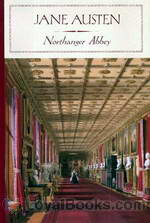 Northanger Abbey
Northanger Abbey
Jane Austen’s Northanger Abbey is a book about the life of Catherine Morland and her romantic relationships. The novel is divided into two parts; the first part begins with Catherine’s visit to Bath and her relationship with Henry Tilney and the other people she met there, and the second part starts with the arrival of Frederick Tilney and her visit to Northanger Abbey. This book alongside Pride and Prejudice and Sense and Sensibility is considered one of the major works of Jane Austen. The novel had undergone many revisions before its publication and it was even originally titled “Catherine... | |
By: Mark Twain (1835-1910) | |
|---|---|
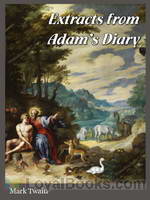 Extracts from Adam's Diary
Extracts from Adam's Diary
Get the true story of Adam and Eve, straight from the source. This humorous text is a day-to-day account of Adam’s life from happiness in the “GARDEN-OF-EDEN” to their fall from grace and the events thereafter. Learn how Eve caught the infant Cain, and Adam takes some time to learn exactly what it is. | |
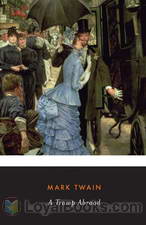 A Tramp Abroad
A Tramp Abroad
A Tramp Abroad is a work of non-fiction travel literature by American author Mark Twain, published in 1880. The book details a journey by the author, with his friend Harris (a character created for the book, and based on his closest friend, Joseph Twichell), through central and southern Europe. While the stated goal of the journey is to walk most of the way, the men find themselves using other forms of transport as they traverse the continent. The book is often thought to be an unofficial sequel to an earlier Twain travel book,The Innocents Abroad... | |
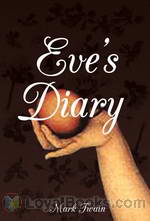 Eve's Diary
Eve's Diary
Eve's Diary is a comic short story by Mark Twain. It was first published in the 1905 Christmas issue of the magazine Harper's Bazaar, and in book format in June 1906 by Harper and Brothers publishing house. It is written in the style of a diary kept by the first woman in the Judeao-Christian creation myth, Eve, and is claimed to be "translated from the original MS." The "plot" of this novel is the first-person account of Eve from her creation up to her burial by, her mate, Adam, including meeting and getting to know Adam, and exploring the world around her, Eden... | |
 Mark Twain's (Burlesque) Autobiography and First Romance
Mark Twain's (Burlesque) Autobiography and First Romance
Mark Twain's (Burlesque) Autobiography and First Romance, a short volume, published by Sheldon & Co., NY in 1871, is Mark Twain's third book. It consists of two stories - First Romance, which had originally appeared in The Express in 1870, and A Burlesque Autobiography (bearing no relationship to Twain's actual life), which first appeared in Twain's Memoranda contributions to the Galaxy. Rather, the content consists of a few short stories of fictional characters who are supposedly part of Twain's lineage... | |
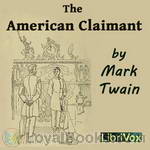 The American Claimant
The American Claimant
The American Claimant is an 1892 novel by American humorist and writer Mark Twain. The story focuses on the class differences and expectations of monarchic, hierarchical Britain and the upstart, "all men are created equal" America. Twain wrote the novel with the help of phonographic dictation, the first author (according to Twain himself) to do so. This was also (according to Twain) an attempt to write a book without mention of the weather, the first of its kind in fictitious literature. Indeed, all the weather is contained in an appendix, at the back of the book, which the reader is encouraged to turn to from time to time. | |
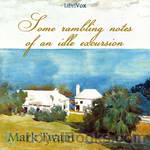 Some Rambling Notes of an Idle Excursion
Some Rambling Notes of an Idle Excursion
Written for the Atlantic magazine in 1877, this is a collection of stories about a trip Mark Twain made with some friends to Bermuda. It contains fascinating descriptions of Bermuda the island, and some of its people as well as an explanation of why Bermuda's houses are "so white". | |
By: William Shakespeare (1564-1616) | |
|---|---|
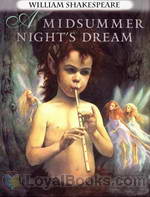 A Midsummer Night's Dream
A Midsummer Night's Dream
Summer nights, romance, music, comedy, pairs of lovers who have yet to confess their feelings to each other, comedy and more than a touch of magic are all woven into one of Shakespeare's most delightful and ethereal creations – A Midsummer Night's Dream. The plot is as light and enchanting as the settings themselves. The Duke of Athens is busy with preparations for his forthcoming wedding to Hippolyta the Amazonian Queen. In the midst of this, Egeus, an Athenian aristocrat marches in, flanked by his lovely daughter Hermia and her two suitors, Lysander and Demetrius... | |
 As You Like It
As You Like It
In a tiny French dukedom, a younger brother usurps his elder brother's throne. Duke Senior is banished to the Forest of Arden along with his faithful retainers, leaving his lovely daughter Rosalind behind to serve as a companion for the usurper's daughter, Celia. However, the outspoken Rosalind soon earns her uncle's wrath and is also condemned to exile. The two cousins decide to flee together and join Duke Senior in the forest. Meanwhile, a young nobleman, Orlando is thrown out of his home by his cruel older brother Oliver... | |
 The Merchant of Venice
The Merchant of Venice
William Shakespeare's The Merchant of Venice was probably written between 1596 and 1598, and was printed with the comedies in the First Folio of 1623. Bassanio, an impoverished gentleman, uses the credit of his friend, the merchant Antonio, to borrow money from a wealthy Jew, Shylock. Antonio pledges to pay Shylock a pound of flesh if he defaults on the loan, which Bassanio will use to woo a rich heiress, Portia. A subplot concerns the elopement of Shylock's daughter Jessica with a Christian, Bassanio's friend Lorenzo... | |
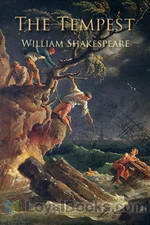 The Tempest
The Tempest
Banished from his own lands by a usurping brother, Prospero and his daughter Miranda have been living on a deserted island for years, until fate brings the brother within the range of Prospero's powers. Will he seek revenge, or reconcilement? | |
 Much Ado About Nothing
Much Ado About Nothing
Written around the middle of his career, Much Ado About Nothing is one of Shakespeare's great festive comedies. The men are back from the war, and everyone is ready for romance. The dashing young Claudio falls for Hero, the daughter of Leonato, governor of Messina, and his friend Don Pedro helps him secure her affection. These youthful lovers are contrasted with the more experienced (and more cynical) Benedick and Beatrice, who have to be tricked into falling in love. Don Pedro's bastard brother, Don John, provides the intrigue, and the dimwitted constable Dogberry provides the laughs. | |
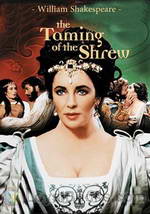 The Taming of the Shrew
The Taming of the Shrew
The Taming of the Shrew is one of Shakespeare's earliest comedies, and was inspired by classical Roman comedy and the Italian commedia dell'arte. Baptista Minola, a rich gentleman of Padua, has two daughters: Katherina, renowned for her sharp tongue, and Bianca, who is sought after by multiple suitors. Baptista decides that Bianca cannot marry until her elder sister finds a husband. Enter Petruchio, who has come to "wive it wealthily in Padua," and who is convinced by Bianca's suitors to woo Katherina. The play ultimately poses the question of who is the bigger shrew: Kate or Petruchio. The subplot involves the subterfuge employed by Lucentio to woo the lovely Bianca. | |
 All's Well That Ends Well
All's Well That Ends Well
Despite its optimistic title, Shakespeare's All's Well That Ends Well has often been considered a "problem play." Ostensibly a comedy, the play also has fairy tale elements, as it focuses on Helena, a virtuous orphan, who loves Bertram, the haughty son of her protectress, the Countess of Rousillon. When Bertram, desperate for adventure, leaves Rousillon to serve in the King's army, Helena pursues him. | |
 The Comedy of Errors
The Comedy of Errors
The Comedy of Errors is one of William Shakespeare's earliest plays, believed to have been written between 1592 and 1594. It is his shortest and one of his most farcical comedies, with a major part of the humour coming from slapstick and mistaken identity, in addition to puns and word play. The Comedy of Errors tells the story of two sets of identical twins that were accidentally separated at birth. Antipholus of Syracuse and his servant, Dromio of Syracuse, arrive in Ephesus, which turns out to be the home of their twin brothers, Antipholus of Ephesus and his servant, Dromio of Ephesus... | |
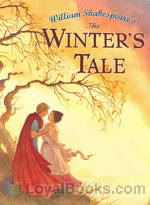 The Winter's Tale
The Winter's Tale
Mad with jealousy, King Leontes of Sicilia orders his best friend Polixenes killed, his child abandoned, and his wife put on trial for adultery. Sixteen years later, Perdita, raised as a shepherd's daughter, falls in love with Polixenes's royal son and returns to her father's kingdom. | |
 Measure For Measure
Measure For Measure
Generally considered one of Shakespeare's problem plays, Measure for Measure examines the ideas of sin and justice. Duke Vincentio turns Vienna's rule over to the corrupt Angelo, who sentences Claudio to death for having impregnated a woman before marriage. His sister Isabella, a novice nun, pleads for her brother's life, only to be told that he will be spared if she agrees to relinquish her virginity to Angelo. | |
 Love's Labour's Lost
Love's Labour's Lost
Love's Labour's Lost is an early comedy by William Shakespeare. Ferdinand, the King of Navarre, and his three friends take a vow of study and seclusion for three years, during which they are forbidden to see or speak to women. Their vows are immediately tested by the arrival of the Pricess of France and her three ladies to the King's court. | |
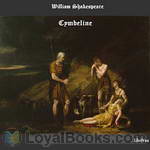 Cymbeline
Cymbeline
Cymbeline is one of Shakespeare's late romances, which (like The Tempest and The Winter's Tale) combines comedy and tragedy. Imogen, the daughter of King Cymbeline of Britain, angers her father when she marries Posthumus, a worthy but penniless gentleman. The King banishes Posthumus, who goes to Rome, where he falls prey to the machinations of Iachimo, who tries to convince him that Imogen will be unfaithful. Meanwhile, the Queen (Imogen's stepmother) plots against her stepdaughter by trying to plan a match between Imogen and her worthless son Cloten. | |
 The Two Gentlemen of Verona
The Two Gentlemen of Verona
The Two Gentlemen of Verona is the earliest comedy written by Shakespeare (and possibly his first play), probably written around 1590-91. It focuses on two friends, Valentine and Proteus, whose friendship is disrupted by their mutual passion for the lovely Silvia. Proteus jilts Julia in order to pursue Silvia; she responds by enlisting the help of her maid Lucetta to dress as a boy and go after Proteus. The play also includes some wonderfully comic supporting characters, particularly Launce and his scene-stealing dog Crab. | |
 Troilus and Cressida
Troilus and Cressida
Troilus and Cressida is Shakespeare's "problem" play about the Trojan War. As the opening Chorus tells us, the play "begins in the middle" of the epic conflict, and counterpoints the drama of battle with the romance of the title characters. Just as Agamemnon and his Greek forces (particularly the smooth-tongued Ulysses) attempt to woo the invincible Achilles to resume fighting on their side, the Trojan go-between Pandarus tries to bring together Troilus, a son of King Priam, with his niece, the lovely Cressida. | |
 The Merry Wives of Windsor
The Merry Wives of Windsor
The Merry Wives of Windsor is a comedy by William Shakespeare, first published in 1602, though believed to have been written prior to 1597. It features the fat knight Sir John Falstaff, and is Shakespeare's only play to deal exclusively with contemporary Elizabethan era English middle class life. | |
 Measure for Measure
Measure for Measure
| |
 Pericles
Pericles
| |
 Measure for Measure
Measure for Measure
| |
 Measure for Measure
Measure for Measure
| |
 History of Troilus and Cressida
History of Troilus and Cressida
| |
By: Oscar Wilde (1854-1900) | |
|---|---|
 The Canterville Ghost
The Canterville Ghost
An American diplomat's family moves into an ancient stately mansion. They're warned by the owner that it is haunted by a most horrifying and gruesome spirit who had once cruelly murdered his own wife. The story progresses with creaking floor boards, mysterious passages, dark attics, clanking chains, and weird howling. Yet, the reader is totally unprepared for Oscar Wilde's brand of tongue in cheek humor as he takes all the ingredients of a traditional ghost story and turns it on its head, and creates a hilarious parody instead of a morbid saga! The Canterville Ghost was the first of Oscar Wilde's short stories to be published... | |
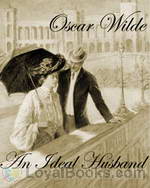 An Ideal Husband
An Ideal Husband
This story opens at a fashionable dinner party in Sir Robert Chiltern's home in the heart of London's stylish Grosvenor Square. One of Lady Chiltern's old school-friends, Mrs. Cheveley, a woman with a dubious past, accosts Sir Robert and threatens to expose a financial crime that he had once participated in, unless he agrees to finance a fraudulent construction project that she's promoting. Lady Chiltern is astounded when her husband who had been the severest critic of this project suddenly begins to speak in its favor... | |
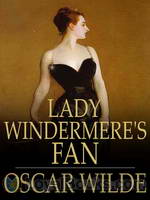 Lady Windermere's Fan
Lady Windermere's Fan
Lady Windermere’s Fan: A Play About a Good Woman is a four act comedy by Oscar Wilde, published in 1893. As in some of his other comedies, Wilde satirizes the morals of Victorian society, and attitudes between the sexes. The action centres around a fan given to Lady Windermere as a present by her husband, and the ball held that evening to celebrate her 21st birthday. | |
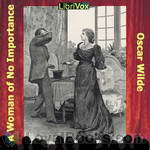 A Woman of No Importance
A Woman of No Importance
A Woman of No Importance is a play by Irish playwright Oscar Wilde. The play premièred on 19 April 1893 at London's Haymarket Theatre. It is a testimony of Wilde's wit and his brand of dark comedy. It looks in particular at English upper class society and has been reproduced on stages in Europe and North America since his death in 1900. | |
By: P. G. Wodehouse (1881-1975) | |
|---|---|
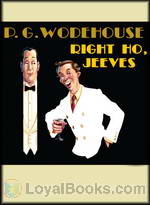 Right Ho, Jeeves
Right Ho, Jeeves
If you're encountering the zany Bertie Wooster and his exceptionally astute Man Friday, Jeeves, for the first time, be assured that you're embarking on a lifetime of fun and laughter! On the other hand, for eternal Wodehouse fans, Right Ho Jeeves provides more glimpses of the delightful world created by one of the best loved English writers. It is the second in the series of Bertie Wooster and Jeeves novels and features some of the regular characters of Brinkley Court, the country seat ruled over by Bertie's much-loved Aunt Dahlia... | |